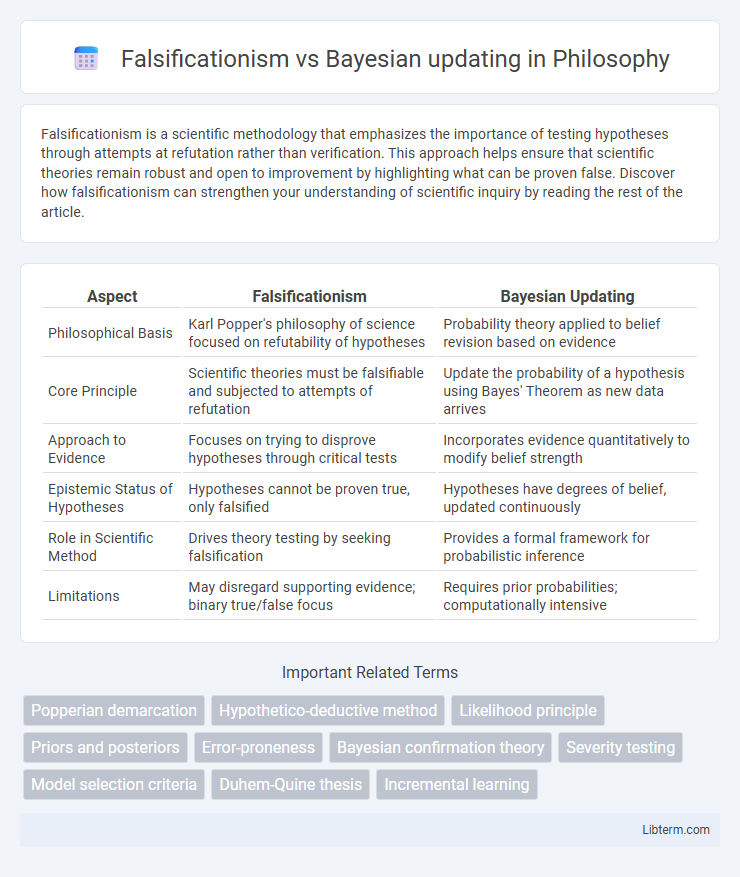Falsificationism is a scientific methodology that emphasizes the importance of testing hypotheses through attempts at refutation rather than verification. This approach helps ensure that scientific theories remain robust and open to improvement by highlighting what can be proven false. Discover how falsificationism can strengthen your understanding of scientific inquiry by reading the rest of the article.
Table of Comparison
| Aspect | Falsificationism | Bayesian Updating |
|---|---|---|
| Philosophical Basis | Karl Popper's philosophy of science focused on refutability of hypotheses | Probability theory applied to belief revision based on evidence |
| Core Principle | Scientific theories must be falsifiable and subjected to attempts of refutation | Update the probability of a hypothesis using Bayes' Theorem as new data arrives |
| Approach to Evidence | Focuses on trying to disprove hypotheses through critical tests | Incorporates evidence quantitatively to modify belief strength |
| Epistemic Status of Hypotheses | Hypotheses cannot be proven true, only falsified | Hypotheses have degrees of belief, updated continuously |
| Role in Scientific Method | Drives theory testing by seeking falsification | Provides a formal framework for probabilistic inference |
| Limitations | May disregard supporting evidence; binary true/false focus | Requires prior probabilities; computationally intensive |
Introduction to Falsificationism and Bayesian Updating
Falsificationism, proposed by Karl Popper, asserts that scientific theories must be testable and refutable through empirical evidence, emphasizing the importance of critical experiments that can potentially disprove hypotheses. Bayesian updating is a probabilistic approach where prior beliefs are revised based on new data using Bayes' theorem, continuously refining the probability of a hypothesis being true. Both frameworks address theory evaluation but differ fundamentally: falsificationism seeks conclusive disproof, while Bayesian updating quantifies belief adjustments in light of evidence.
Philosophical Foundations of Scientific Reasoning
Falsificationism, rooted in Karl Popper's philosophy, emphasizes that scientific theories can never be conclusively proven but only rigorously tested and potentially falsified through empirical observation. Bayesian updating, grounded in probability theory, treats scientific reasoning as a dynamic process where prior beliefs are continuously updated with new evidence to refine the probability of a hypothesis. Both approaches highlight the iterative nature of scientific inquiry, with falsification focusing on refutation and Bayesian methods on probabilistic confirmation within the philosophical foundations of scientific reasoning.
Core Principles of Falsificationism
Falsificationism centers on the principle that scientific theories must be testable and inherently refutable through empirical evidence, emphasizing the importance of bold conjectures and rigorous attempts to disprove them. This approach demands that hypotheses undergo stringent falsification tests rather than confirmation attempts, promoting the growth of knowledge by eliminating false theories. Core to falsificationism is the demarcation criterion, which distinguishes scientific theories from non-scientific claims based on their capacity to be falsified.
Key Concepts in Bayesian Updating
Bayesian updating involves revising probabilities in light of new evidence using Bayes' theorem, emphasizing prior beliefs and likelihood functions as core components. The posterior probability represents the updated belief after incorporating new data, balancing prior knowledge with observed information through a mathematically rigorous framework. This probabilistic approach contrasts with falsificationism's focus on hypothesis refutation by allowing degrees of belief rather than absolute truth values.
Comparing Approaches to Hypothesis Testing
Falsificationism emphasizes rigorous testing by attempting to refute hypotheses through empirical evidence, ensuring scientific theories are provisional and subject to rejection. Bayesian updating, contrastingly, quantifies the probability of hypotheses by continuously integrating new data to adjust belief strengths, allowing for probabilistic rather than binary conclusions. While falsificationism prioritizes falsifiability as the hallmark of scientific credibility, Bayesian methods provide a mathematically coherent framework for hypothesis revision under uncertainty.
Treatment of Evidence: Refutation vs. Probabilistic Support
Falsificationism treats evidence as a critical test that can refute a hypothesis if observations contradict its predictions, emphasizing decisive falsification over confirmation. Bayesian updating assigns probabilistic support to hypotheses by continuously adjusting their likelihood based on new evidence, reflecting degrees of belief rather than absolute rejection. This fundamental difference positions falsification as a binary, rule-driven approach, while Bayesian inference operates within a gradient framework of evidence evaluation.
Strengths and Limitations of Falsificationism
Falsificationism offers a clear criterion for scientific progress by emphasizing the refutation of hypotheses, which helps eliminate false theories and promotes rigorous testing. However, it struggles with handling complex theories that cannot be easily falsified and may overlook the probabilistic nature of scientific evidence. This approach also tends to neglect prior knowledge and the dynamic updating of beliefs, limiting its adaptability compared to Bayesian updating.
Advantages and Challenges of Bayesian Updating
Bayesian updating offers a dynamic framework for integrating new evidence with prior beliefs, providing a coherent probabilistic approach to knowledge revision that adapts continuously as data accumulates. This method excels in handling uncertainty and incorporating complex models, making it particularly useful in fields like machine learning and predictive analytics. Challenges include the requirement for accurate prior distributions, computational intensity for large datasets, and potential difficulty in interpretation when priors heavily influence posterior outcomes.
Practical Applications in Scientific Research
Falsificationism drives scientific research by emphasizing hypothesis testing through decisive experiments and aiming to refute theories, making it practical in identifying false claims and refining scientific models. Bayesian updating supports research by quantifying evidence and continuously adjusting the probability of hypotheses, enhancing decision-making under uncertainty with real-time data integration. Both methodologies complement practical applications: falsification ensures robust theory validation, while Bayesian methods optimize model precision and adaptability in iterative experimental settings.
Towards a Synthesis: Complementarity and Future Directions
Falsificationism, emphasizing hypothesis testing through refutation, complements Bayesian updating, which quantifies belief revision based on evidence. Integrating these frameworks offers robust epistemological tools, combining the rigorous critique of falsificationism with the probabilistic nuance of Bayesian inference. Future research directions highlight developing hybrid models that capitalize on falsification's logical clarity and Bayesian adaptability to improve scientific theory evaluation.
Falsificationism Infographic

 libterm.com
libterm.com